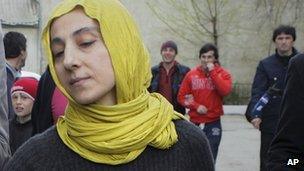Boston Marathon bombing: US officials in Dagestan
- Published

US officials have travelled to the Russian republic of Dagestan to speak to the parents of the Boston Marathon bombing suspects.
Dzhokhar and Tamerlan Tsarnaev lived briefly in Dagestan, and Tamerlan made a lengthy visit there in 2012.
The US is seeking more information on the visit, and whether he became radicalised through his contacts there.
Tamerlan died in the police operation to capture the brothers. Dzhokhar, the younger of the two, was injured.
He remains in hospital with serious injuries, and has been charged by federal prosecutors with using a weapon of mass destruction and malicious destruction of property resulting in death. He could be sentenced to death if convicted on either count.
The twin bombs which exploded near the finishing line of the marathon killed three people and injured more than 200, many of them seriously.
'Shift the blame'
The Tsarnaev brothers had origins in the troubled, predominantly Muslim republic of Chechnya in southern Russia.
They had been living in the US for about a decade at the time of the attack, but in 2012, Tamerlan Tsarnaev returned to Russia to visit. He spent six months in Chechnya and bordering Dagestan, another Muslim Russian republic which has struggled to shake off an Islamist insurgency.
The brothers' parents, Anzor and Zubeidat Tsarnaev, have said they believe they are innocent and were framed by US security forces.
On Tuesday, a delegation from the US embassy in Moscow arrived in Dagestan to interview them.
The BBC's Steve Rosenberg, in Dagestan, says those discussions lasted long into the night.
It was unclear exactly which officials were carrying out the interviews, but an embassy official told the AFP news agency: "The FBI is receiving co-operation from the Russian government in its investigation of the Boston Marathon bombing."
The interior minister of Dagestan, however, has denied that the dead suspect became a follower of radical Islam while staying in the republic, Russia's Interfax news agency reports.
Abdurashid Magomedov said the allegations were "an attempt to shift the blame", and that there is no record of him having contact with the "bandit underground" in the region.
Some Tsarnaev family members blamed the influence of a Muslim convert for steering Tamerlan Tsarnaev towards radicalisation.
"Somehow, he just took his brain," said the brothers' uncle, Ruslan Tsarni, who recalled conversations with the bomb suspects' worried father about the convert's influence.
Spotlight on FBI
Meanwhile, US law enforcement agencies are facing questions at home over whether they could have done more to prevent the 15 April attacks, and whether the FBI failed to act on Russian concerns that Tamerlan Tsarnaev was becoming radicalised.
He was questioned in 2011 amid claims he had adopted radical Islam.
After a closed hearing on Tuesday, members of the Senate Intelligence Committee said steps could be taken to improve information sharing between agencies.
Republican Senator Susan Collins said there appeared to be "serious problems with sharing information, including critical investigative information... not only among agencies but also within the same agency in one case", the Associated Press (AP) news agency reports.
The vice-chairman of the committee, Republican Senator Saxby Chambliss, said he could not see "anybody yet that dropped the ball", but that he was still seeking information on whether information was properly shared.
"If it wasn't, we've got to fix this," AP quoted him as saying.
On Monday, a 10-page criminal complaint was filed against Dzhokhar Tsarnaev during a court hearing around his hospital bed.
According to a transcript of the hearing, he managed to speak once despite a gunshot wound to his throat sustained during his capture.
Anonymous officials have told US media that 19-year-old Dzhokhar Tsarnaev said he and his 26-year-old brother had planned the attack themselves without help from foreign militants.
The officials say that his written answers lead them to believe the pair were motivated by jihadist ideology and had devised the bombings using the internet.
However, the sources also said the interviews were preliminary and they needed to verify the defendant's responses.